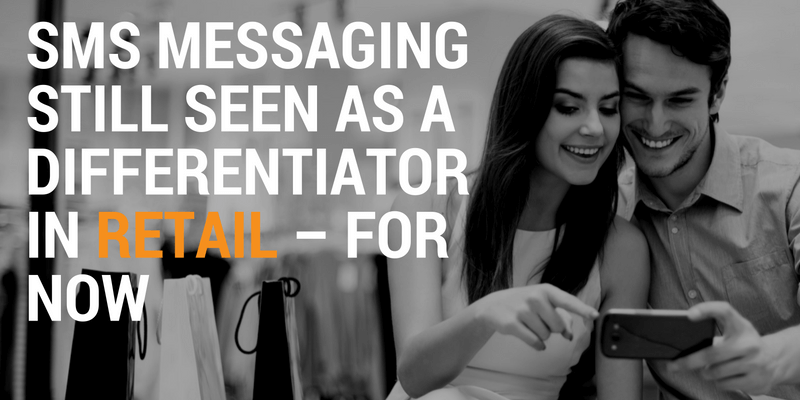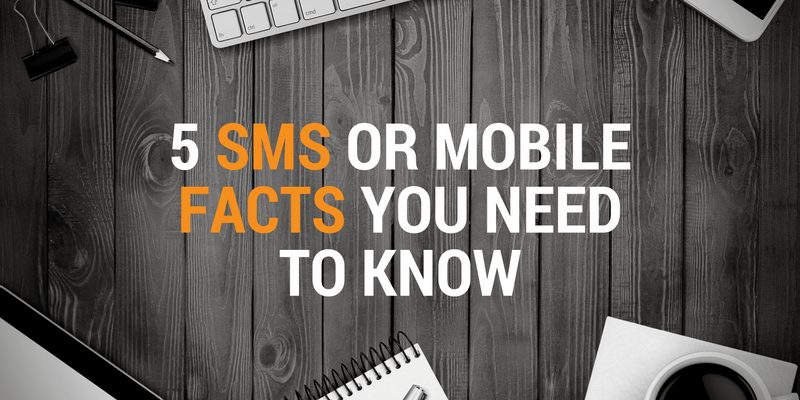SMS Messaging Still Seen As A Differentiator In Retail – For Now

Internet Retailer surveyed “100 e-commerce retail professionals” from their mailing list for a mobile messaging survey. The results were somewhat surprising.
SMS ranked 5th for channels currently used by retailers. Email and social media were ranked much higher – even phone calls came before SMS!
- 97% email
- 82% Social media
- 66% phone calls
- 32% mobile apps
- 29% SMS messaging
- 25% OTT messaging (chat apps like Line and WhatsApp)
- 20% Push notifications
Out of those who said they didn’t use SMS, a startling 16.9% said they didn’t “know anything about SMS messaging for business”. Over 50% knew about it, thought it would be useful, but haven’t made it a priority.
What those non-SMS users said they need in order to make it a priority is “seeing an opportunity to drive revenue or improve customer service”.
Opportunity Is Everywhere
I’d have to say those respondents just haven’t been looking. If they had, they’d have seen opportunity in every retail business sector. Both online and brick and mortar stores have numerous examples of ROI in the hundreds to thousands of percent. Case studies of improved customer service and reduced costs are plentiful too.
In the Internet Retailer report, they described how one of the “world’s largest retailers of PCs, tablets and smart phones” used SMS messaging to engage its customers in the US and Canada. They used a two-way SMS programme that enabled them to get the customers connected to a “device diagnostics service”.
Because of the service, the company immediately reduced their technical support costs and the time it took to reach a resolution on the issues. Their customers were happier too because of the faster turnaround times. Since it was such a success, they’ve since rolled the programme out to 30 more countries.
Who Is Using It
It isn’t just big companies finding success with SMS messaging. The survey included responses from retailers who have online or physical locations with 50% saying they are both. Business of all sizes are included too, from under $5 million to over $1 billion in revenue (~£4M and £760M). In fact, 43% of respondents were in the under $5 million category.
When asked about the reasons that drove them to use SMS, “Opportunity to differentiate” won out at 69%. But that advantage may not hold out for too long.
This report, and other surveys, show that SMS messaging in retail is still gaining ground. It probably won’t be too long before the 50% that knows it can be good will actually start investing in it. SMS will become a priority when they finally see a use case that reflects their business, their customers demand it, or they are put at a competitive disadvantage by not using it.
While SMS is different than email, it may end up following a similar pattern when it comes to communication. Everyone uses email. So much so that it is often ignored or missed by the customers that receive it.
At the moment, SMS can break through all that noise because people still check their messages almost immediately. But as more companies begin using it, customers may become jaded, or may choose not to sign up to any more SMS lists. At least they will likely be more selective as to which ones they choose.
If that happens, then it will be easier for retailers that started using it early on. They will have their lists, loyal customers, and the processes in place to make the most of what they have.
So if you’re one of that 50% that know about SMS but haven’t made it a priority, we’re here to help you understand how easy it can be to add it into your mix of channels. We have industry specific reports you can view here, and our guide to using SMS in mobile marketing here. This blog is also filled with examples, advice and information for retailers.
We’re also happy to talk to you by live chat or on the phone to ensure all your questions get answered.
If you’re in the 15.5% of the respondents who were actively looking for an SMS service provider, you can download our buyer’s guide here. It’s chock full of tips and questions you should ask any provider you’re considering. We’d be happy to talk to you too, and answer any questions.
Related Articles
How Wayne Dyer Inspired SMS Messaging
If you’re tuned into the self-help industry at all, you know who Wayne Dyer was. He spent decades writing transformational books to help people improve their lives and find happiness. He died summer 2015 at his home in Maui at the age of 75. It’s probably an understatement to say he inspired millions of people. So when I came across an article about a publisher using SMS messaging to let people know about a new book discussing his legacy I wasn’t too surprised. Not at first anyway.
What Your Customers Want From SMS Marketing
Mobile marketing offers an unprecedented access to your customers virtually any time, anywhere. This is particularly true for SMS marketing because it is “always on”. Customers don’t have to be surfing the web, or using an app to receive messages. Instead, they see the marketing messages right alongside ones from their friends and family.
SMS Messaging Makes for Great Customer Service
It was late Thursday afternoon on a busy week when I heard the familiar jingle. I received a text message from the company I rented a DVD from about a week prior (I know, who rents DVDs these days - but stay with me). They wanted to ask if I’d forgotten about it, since I hadn’t yet returned it. Indeed I had forgotten.
How SMS Can Help Your Local Business Optimise Your Local Campaign
One of the great advantages of SMS: it's completely trackable so you know exactly how your campaigns are engaging your opted in customers and clients. And if you’re a small business, operating in a specific geographical location, then that local knowledge can be invaluable in targeting your campaigns to a local audience.
SMS Marketing for a Blockbuster Black Friday
SMS Marketing For The Equestrian Sector
The British Equestrian Trade Association’s findings from their National Equestrian Survey 2015 put the economic value of the equestrian sector at £4.3 billion of consumer spending across a wide range of goods and services, with the average spend per horse during the same year at £3600. It is an incredibly varied industry encompassing all types of businesses from sole traders making a living in remote areas to multinational companies. Their customer base typically tends to be busy people who lead largely outdoor lifestyles so the obvious and most effective means of communicating with them is by mobile phone, yet very few equestrian businesses appear to be utilising SMS text messaging marketing. So how could businesses in this sector benefit from this method of marketing?
Work 24/7 Without Being in The Office! The Benefits of SMS Scheduling
In our demanding, 24/7 world it is difficult to stay on top of your SMS marketing campaign but with scheduling you can ensure you are getting your message to your audience whatever the time.
5 SMS or Mobile Facts You Need to Know
So many of us are used to having our mobiles around nearly 24 hours a day that it’s easy to forget it’s still a growing industry. And though SMS has been around for over two decades, the ways we use it and people’s willingness to use it continues to grow. So for this blog I picked out five facts about mobile and SMS that really make the case that SMS for business has come of age. Let’s see if you agree.












